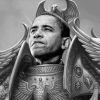- 03 Jul 2013 11:31
#14265608
But a key component, and I meant authoritarian rule by the greatest man is best, regardless of whether a system is technically fascist.
Frankly I don't much relate to any of the intellectual antecedents of fascism or its actual leaders. Why look back at that stuff now, a whole century (and a gazillion advances in knowledge) later? We should be devising a new system.
Figlio di Moros wrote:That's not the definition of Fascism...
But a key component, and I meant authoritarian rule by the greatest man is best, regardless of whether a system is technically fascist.
who are your ideological heroes?
Frankly I don't much relate to any of the intellectual antecedents of fascism or its actual leaders. Why look back at that stuff now, a whole century (and a gazillion advances in knowledge) later? We should be devising a new system.











 I believe it was Streiber who indicated alien societies are like that, so maybe...
I believe it was Streiber who indicated alien societies are like that, so maybe...










 - By Rancid
- By Rancid